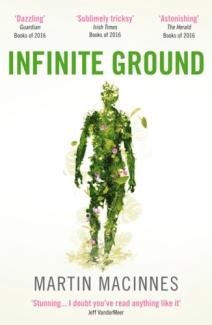
It’s great that I had quite a lot of real and exciting things going on when I was reading Infinite Ground – if I had been reading it in one of my more depressed, more introverted periods, I would have gotten even more depressed by this novel, and who wants any of that.
The novel starts out relatively innocently but then turns into a very unsettling read. The story is set in an unnamed city of an unnamed South American country, where one day Carlos, a reliable and hard-working office worker ups and disappears from the restaurant where he’s having a big meal with his family. As the convention of detective stories dictates, the case is assigned to an experienced old investigator who starts to follow the obvious clues but things take a bizarre and unexpected turn around page 3 (even more bizarre and unexpected than the mystery of a man stepping out to the bathroom and never coming back) when the investigator notices that all the witnesses seem to play a role and seem to recite their statements as if they had learned them by heart, and we suddenly find ourselves in the midst of double (or nonexistent) identities, lives outsourced and lives lived instead of someone else, simulacra, copies and imitations (which are often better and more authentic than the real thing), in an alien and intimidating world where the self crumbles to atoms (and not just metaphorically, but in a biological and chemical sense) and where even the fact seems ridiculous that we claim to have names – after all, names are only temporary and utterly unnecessary words we attach to that bunch of atoms that make up a human for a short while.
Infinite Ground is a biological-existentialist novel, and I’ve never read anything like this before. And as I say, it’s a pretty alarming novel – here your average existential angst doesn’t suffice anymore – here we have to be anxious about what goes on deep down in our cells because, after all, every single change in our cells changes who we are, and then there’s entropy lurking everywhere, ready to level out and smooth over our existence – how the hell are we supposed to have any sense of continuity of self then, a self that could be anxious about the questions of finding or creating meaning, and how the hell are we supposed to think that we have any kind of will (let alone free will), personal choices, responsibility for our actions, or any effect on anything at all?
We have none of this, surely, in this novel. Perhaps as a consequence of this, the story gradually disintegrates as we move on. It’s possible that this disintegration is intentional (it definitely emphasizes the disintegration of the characters), but towards the end I got the feeling that MacInnes himself succumbed to his own brand of bio-existentialism and didn’t even attempt to find meaning anymore as the search was bound to be futile.
The novel suffers from such typical shortcomings of first novels, but even though it’s not a masterpiece executed with sure hands, I’d love to read whatever MacInnes writes in the future because his thoughts are exciting, and he approaches this whole array of questions – who we are, what we are, when do we stop being humans – from a unique perspective.
